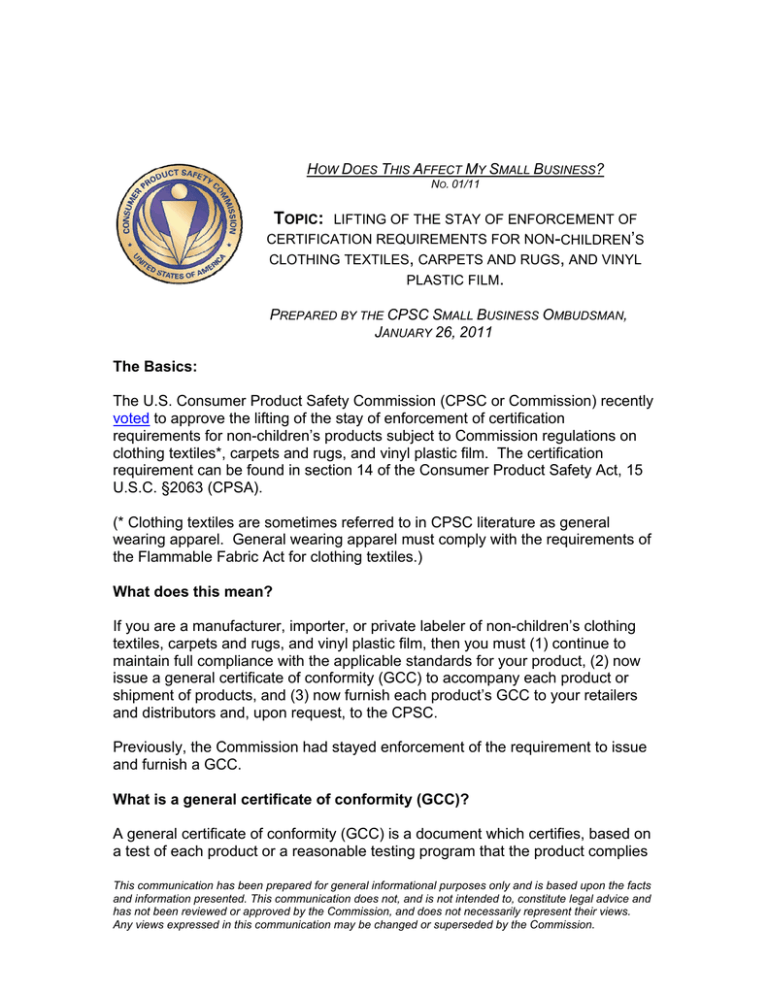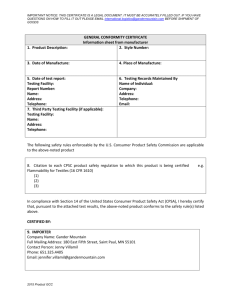topic: lifting of the stay of enforcement
advertisement

HOW DOES THIS AFFECT MY SMALL BUSINESS? NO. 01/11 TOPIC: LIFTING OF THE STAY OF ENFORCEMENT OF CERTIFICATION REQUIREMENTS FOR NON-CHILDREN’S CLOTHING TEXTILES, CARPETS AND RUGS, AND VINYL PLASTIC FILM. PREPARED BY THE CPSC SMALL BUSINESS OMBUDSMAN, JANUARY 26, 2011 The Basics: The U.S. Consumer Product Safety Commission (CPSC or Commission) recently voted to approve the lifting of the stay of enforcement of certification requirements for non-children’s products subject to Commission regulations on clothing textiles*, carpets and rugs, and vinyl plastic film. The certification requirement can be found in section 14 of the Consumer Product Safety Act, 15 U.S.C. §2063 (CPSA). (* Clothing textiles are sometimes referred to in CPSC literature as general wearing apparel. General wearing apparel must comply with the requirements of the Flammable Fabric Act for clothing textiles.) What does this mean? If you are a manufacturer, importer, or private labeler of non-children’s clothing textiles, carpets and rugs, and vinyl plastic film, then you must (1) continue to maintain full compliance with the applicable standards for your product, (2) now issue a general certificate of conformity (GCC) to accompany each product or shipment of products, and (3) now furnish each product’s GCC to your retailers and distributors and, upon request, to the CPSC. Previously, the Commission had stayed enforcement of the requirement to issue and furnish a GCC. What is a general certificate of conformity (GCC)? A general certificate of conformity (GCC) is a document which certifies, based on a test of each product or a reasonable testing program that the product complies This communication has been prepared for general informational purposes only and is based upon the facts and information presented. This communication does not, and is not intended to, constitute legal advice and has not been reviewed or approved by the Commission, and does not necessarily represent their views. Any views expressed in this communication may be changed or superseded by the Commission. with all statutes, regulations, rules, bans, or standards under any law enforced by the Commission. The document also must specifically list each of the statutes, regulations, rules, bans, or standards to which your company is certifying the product. (A GCC is required only for those products for which a statute, regulation, rule, ban, or standard is currently in place.) In addition, the GCC must include the manufacturer’s, importer’s, or private labeler’s name, mailing address, telephone number, contact information, the date and time of manufacture, and the date and place where the product was tested. The full requirements can be found in section 14(g) of the CPSA at 15 U.S.C. §2063(g). Also, for more information, please see the answer to the question below on sample GCCs. How do I know if my product is affected by the lifting of the stay of enforcement on January 26, 2011? Please see the chart below. Generally, the regulations addressed by this particular lifting of the stay of enforcement are as follows for non-children’s products: Carpets and rugs (16 CFR parts 1630 and 1631) Vinyl plastic film (16 CFR part 1611) Clothing Textiles* (16 CFR part 1610) (* Clothing textiles are sometimes referred to in CPSC literature as general wearing apparel. General wearing apparel must comply with the requirements of the Flammable Fabric Act for clothing textiles.) Specific answers regarding these three Flammable Fabric Act regulations are available at the bottom of this list of Q & As. Who must issue the certificate? Under the Commission’s rule on GCCs, the certificate must be issued by the importer for products manufactured overseas. The certificate must be issued by the U.S. manufacturer for products manufactured domestically. This communication has been prepared for general informational purposes only and is based upon the facts and information presented. This communication does not, and is not intended to, constitute legal advice and has not been reviewed or approved by the Commission, and does not necessarily represent their views. Any views expressed in this communication may be changed or superseded by the Commission. To whom must I provide my GCC? If you are an importer or U.S. manufacturer, you must "furnish" the GCC to your distributors and retailers. The Commission’s rule states that the requirement to “furnish” the GCC is satisfied if the importer or U.S. manufacturer provides its distributors and retailers a reasonable means to access the certificate. You can provide the actual hard copy of the GCC to your distributors and retailers, or you could provide a dedicated website with that specific certificate on your invoice. (See the answer addressing electronic certificates below.) Where must these certificates be filed? A certificate does not have to be filed with the government. As noted above, the certificate must “accompany” the product shipment, and be “furnished” to distributors and retailers, and, upon request, to the CPSC. On what does my certification have to be based? The general conformity certification must be based on a test of each product or a reasonable testing program. Must the certifier sign the certificate? No. Issuing the certificate satisfies the new law. It does not have to be signed by the issuer. When does the GCC requirement become mandatory? The stay of enforcement will be lifted as of January 26, 2011. Are small businesses exempt? No. The law does not provide exemptions or exceptions based on the size of the business. What if I sell directly to consumers and do not use retailers or distributors? The law requires that manufacturers, importers, or private labelers issue GCCs, that the GCCs accompany each product or shipment of products, and that GCCs be furnished to retailers and distributors and, upon request, to the CPSC. Accordingly, GCCs are not required to be furnished to consumers in direct-toconsumer sales but manufacturers, importers, or private labelers are still obligated to issue GCCs and, upon request, furnish them to the CPSC. This communication has been prepared for general informational purposes only and is based upon the facts and information presented. This communication does not, and is not intended to, constitute legal advice and has not been reviewed or approved by the Commission, and does not necessarily represent their views. Any views expressed in this communication may be changed or superseded by the Commission. Does the CPSC have a sample GCC? Yes. There is a model of how to draft a GCC at: http://www.cpsc.gov/about/cpsia/faq/elecertfaq.pdf. You may, but are not required to, copy the layout, title the document “General Certificate of Conformity,” and include the details pertinent to your product, or, if you prefer, you may create your own form so long as it captures all of the requirements of section 14(g) of the Consumer Product Safety Act. Is a GCC required for each shipment of my product? Yes. The law requires that each import (and domestic manufacturer) shipment be “accompanied” by the required certificate. The requirement applies to imports and products manufactured domestically. Under CPSC regulations, an electronic certificate is “accompanying” a shipment if the certificate is identified by a unique identifier and can be accessed via a World Wide Web URL or other electronic means, provided the URL or other electronic means and the unique identifier are created in advance and available with the shipment. Are there penalties for noncompliance? Yes. Failure to furnish a certificate of conformity, to issue a false certificate of conformity under certain conditions, and to otherwise fail to comply with section 14 of the CPSA is a violation of section 19(a)(6) of the CPSA and may lead to the imposition of civil penalties of up to $100,000 per violation, limited to a maximum of $15 million for any related series of violations, in addition to possible criminal penalties and asset forfeiture. Can electronic certificates rather than paper be used to meet the requirements of Section 102? The Commission has issued a rule specifically allowing use of an electronic certificate provided that the Commission has reasonable access to it, it contains all of the information required by section 14 of the CPSA, and it complies with the other requirements of the rule. This communication has been prepared for general informational purposes only and is based upon the facts and information presented. This communication does not, and is not intended to, constitute legal advice and has not been reviewed or approved by the Commission, and does not necessarily represent their views. Any views expressed in this communication may be changed or superseded by the Commission. Flammable Fabrics Act What is a “guaranty” under the Flammable Fabrics Act, and how does it relate to a GCC? Certain fabric manufacturers offer “guaranties” to their buyers that their product(s) comply with federal Flammable Fabric Act (FFA) requirements. Nevertheless, the importer or the U.S. manufacturer is always responsible for the issuance of a GCC, regardless of whether their respective supplier has offered them a guarantee. For non-children’s clothing textiles, carpets and rugs, and vinyl plastic film, manufacturers may rely on their suppliers’ guarantees if furnished in good faith and with written assurances from the supplier that the product has been subjected to a reasonable testing program. Otherwise, manufacturers must conduct their own tests. A FFA guaranty may be relied upon as a bar to prosecution only if the guarantor/supplier resides in the United States. For more information on Flammable Fabrics Act guaranties, review the CPSC’s Frequently Asked Questions for Continuing Guaranties under the Flammable Fabrics Act and Filed with the Commission and you may also search for continuing guaranties on file with the CPSC. I am simply taking Flammable Fabrics Act-approved fabrics available at my local fabric store and sewing them together into adult general wearing apparel. Does this make me a manufacturer, subject to these requirements? Yes. Once you take the raw material, like a clothing textile, and alter it into wearing apparel, you become a “manufacturer” for purposes of this requirement. As discussed above, you may rely in good faith upon the supplier’s guarantees, if the supplier states in writing that the product has been subjected to a reasonable testing program, and if you maintain a copy of the supplier’s paperwork in your records. You are always responsible for issuing the GCC. What about children’s products subject to Commission regulations on clothing textiles, carpets and rugs, and vinyl plastic film? This summary document addresses non-children’s clothing textiles, carpets and rugs, and vinyl plastic film. This communication has been prepared for general informational purposes only and is based upon the facts and information presented. This communication does not, and is not intended to, constitute legal advice and has not been reviewed or approved by the Commission, and does not necessarily represent their views. Any views expressed in this communication may be changed or superseded by the Commission. Manufacturers of children's clothing textiles, carpets and rugs, and vinyl plastic film, including manufacturers of children's sleepwear, sizes 0 through 6X and 7 through 14, must issue their own certificates of conformity, which have additional requirements than those for non-children’s products. Unlike manufacturers of non-children’s clothing textiles, carpets and rugs, and vinyl plastic film, the children’s version of these products must undergo thirdparty testing from an accredited laboratory, recognized by the CPSC for those specific tests. The labs can be found here. Manufacturers of children's clothing textiles, carpets and rugs, and vinyl plastic film must then issue third-party certificates of conformity which are based upon the test results from the CPSC recognized laboratory. The Commission lifted the stay of enforcement of certification requirements for children’s products subject to Commission regulations on carpets and rugs and vinyl plastic film effective on October 19, 2010 and on November 16, 2010 for children’s clothing textiles and wearing apparel, including sleepwear. Last Updated: January 26, 2011 This communication has been prepared for general informational purposes only and is based upon the facts and information presented. This communication does not, and is not intended to, constitute legal advice and has not been reviewed or approved by the Commission, and does not necessarily represent their views. Any views expressed in this communication may be changed or superseded by the Commission.


